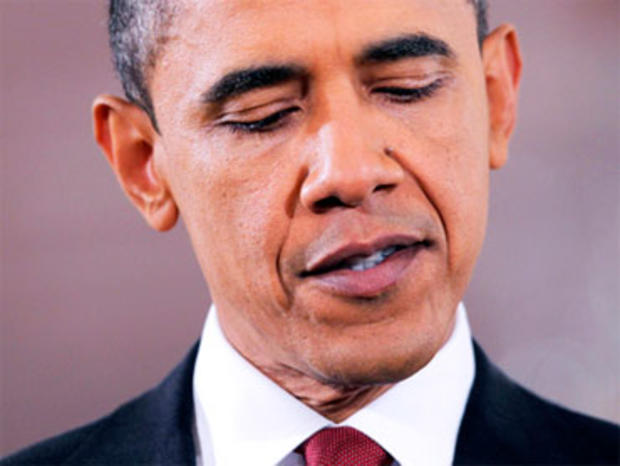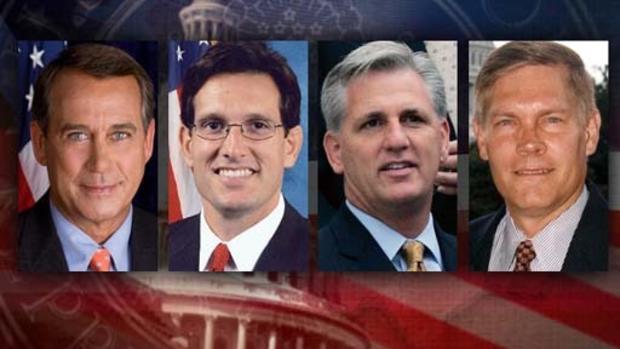Can Obama Feel Americans' Pain?
This post originally appeared on Slate.
Every year the president's doctor gives him a physical. In the second year of his term, the voters give him a colonic. Or, as President Obama put it at his news conference Wednesday, "a shellacking."
In the post-election press conference that has now become a White House tradition, Obama's goal was to show that he "got it." This was the big charge of the campaign, lobbed liberally by both sides. But the election results shifted the burden on the president. Republicans didn't just take over the House and win six seats in the Senate. They picked up a slew of governor's offices and flipped 19 statehouses from Democratic to Republican.
There is a formula for these press conferences after the president's party suffers a big electoral defeat. Bill Clinton in 1994, George W. Bush in 2006, and Obama today all acknowledged that voters wanted an end to partisan bickering and called for a new era of cooperation. This may be true, but it's not the point. All took responsibility for the slow pace of "progress"--a word each put into heavy rotation--but went no further. All refused to admit that the election said anything about their course for the country.
This is all a game of peek-a-boo, because all of the presidents ultimately admit that underneath they know the defeat was much more severe than their careful half-admissions suggest. "I think [the voters] were saying two things to me," Clinton said at his press conference "or maybe three. They were saying--maybe 300." He obviously understood the magnitude. George Bush referred to the 2006 Democratic control as a "thumping." Those kinds of descriptions are candid and invite more candor.
Like Clinton, Obama flirted with frankness. He admitted he had not changed the legislative process as he'd promised. He also said he'd been reflecting about how to handle issues related to businesses and investment. But on the main issue he gave no ground: Obama flat-out rejected that his policies were taking the country in the wrong direction. (In post-election exit polls, 52 percent of voters said Obama's policies were harming the country.)
Ominous Signs For Obama In 2012
Why Democrats Lost the House to Republicans
How Boxer Bucked a National Trend in California
Bush, by contrast, took action in 2006. At his post-Election Day news conference, he announced that Secretary of Defense Donald Rumsfeld was stepping down. The voters didn't force him to do it, but by making the move after the election, Bush showed that he'd gotten the message. Maybe the difference between a first-term president and one in his second is how closely tied the election and the message are. In his first term, Bush contemplated dropping Vice President Dick Cheney to send a similar message but decided against it.
No president is going to admit that he's been on the wrong path, particularly when his opponent says what John Boehner did: "The American people have sent an unmistakable message to him tonight, and that message is, 'Change course.' " But eventually a president can get around to responding to the core protest of an election. Sometimes he allows some time to pass, to make it look like the actions are somewhat disconnected. Clinton, for example, fired no one the day after the election. But he slowly began a program of moving to the middle so that by January 1996 he could declare "the era of big government is over." That was the ultimate signal that he had heard the voters who thought he was too liberal and had moved too fast.
President Obama seemed to be trying to send a similar kind of signal, though it was hard to pick up. He made it clear that the crisis-driven haste of the first part of his term was over. He promised to work with Republicans on energy legislation, education, and reducing earmarks. Where there were disagreements, he said he would go small: "It's doubtful that you could get the votes to pass [cap-and-trade energy legislation] through the House this year or next year or the year after. But that doesn't mean there isn't agreement that we should have a better energy policy. And so let's find those areas where we can agree."
All Election 2010 ResultsWhy Key Midwest Swing States Flipped to the GOP
Harry Reid Wins: How He Did It
Who Are the Tea Party Supporters?
Obama also tried to do a little rewriting of history, saying that because his administration had to respond to crises by, for example, passing an economic stimulus package and bailing out automakers, people thought he was engaged in a systematic expansion of government. "It was an emergency situation," he said. "But I think it's understandable that folks said to themselves, 'You know, maybe this is the agenda as opposed to a response to an emergency.' "
That wasn't the spirit of the early Obama administration. "Never let a crisis go to waste" was former Chief of Staff Rahm Emanuel's saying. He believed that success bred success and that the administration shouldn't risk slowing the pace. The health care bill was an elective policy proposal promoted in this crisis-as-opportunity strategy.
The president is feeling out the new situation. He was cautious in response to an electorate that was not. He seemed to struggle in the press conference, as he has throughout his presidency, with those parts of his job that call on him to convey to people that he understands what they're going through. "You know, there is an inherent danger in being in the White House and being in the bubble," he said. "One of the challenges that we've got to think about is--is how do I meet my responsibilities here in the White House, which require a lot of--a lot of hours and a lot of work, but still have that opportunity to engage with the American people on a--on a day-to-day basis and know--give them confidence that I'm listening to them?"
He doesn't necessarily have to travel to send that message. One place he could have started was at Wednesday's press conference.
More From Slate:
Sen. Jim DeMint's cynical advice to incoming Tea Partiers.
The Supreme Court wonders whether your non-money can fund non-religion.
Have we entered an era of seesaw politics?
John Dickerson is a CBS News political analyst. He is also Slate's chief political correspondent and author of On Her Trail. You can also follow him on Twitter here.


